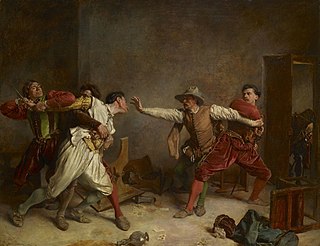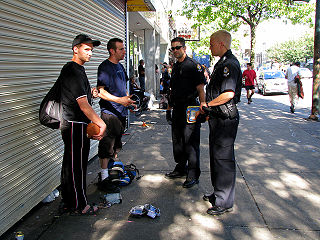
An assault is the illegal act of causing physical harm or unwanted physical contact to another person, or, in some legal definitions, the threat or attempt to do so. It is both a crime and a tort and, therefore, may result in criminal prosecution, civil liability, or both. Additionally, assault is a criminal act in which a person intentionally causes fear of physical harm or offensive contact to another person. Assault can be committed with or without a weapon and can range from physical violence to threats of violence. Assault is frequently referred to as an attempt to commit battery, which is the deliberate use of physical force against another person. The deliberate inflicting of fear, apprehension, or terror is another definition of assault that can be found in several legal systems. Depending on the severity of the offense, assault may result in a fine, imprisonment, or even death.

In many legal jurisdictions related to English common law, affray is a public order offence consisting of the fighting of one or more persons in a public place to the terror of ordinary people. Depending on their actions, and the laws of the prevailing jurisdiction, those engaged in an affray may also render themselves liable to prosecution for assault, unlawful assembly, or riot; if so, it is for one of these offences that they are usually charged.

An arrest is the act of apprehending and taking a person into custody, usually because the person has been suspected of or observed committing a crime. After being taken into custody, the person can be questioned further and/or charged. An arrest is a procedure in a criminal justice system, sometimes it is also done after a court warrant for the arrest.
Bail is a set of pre-trial restrictions that are imposed on a suspect to ensure that they will not hamper the judicial process. Bail is the conditional release of a defendant with the promise to appear in court when required. In some countries, especially the United States, bail usually implies a bail bond, a deposit of money or some form of property to the court by the suspect in return for the release from pre-trial detention. If the suspect does not return to court, the bail is forfeited and the suspect may be charged with the crime of failure to appear. If the suspect returns to make all their required appearances, bail is returned after the trial is concluded.
A citizen's arrest is an arrest made by a private citizen – that is, a person who is not acting as a sworn law-enforcement official. In common law jurisdictions, the practice dates back to medieval England and the English common law, in which sheriffs encouraged ordinary citizens to help apprehend law breakers.
The presumption of innocence is a legal principle that every person accused of any crime is considered innocent until proven guilty. Under the presumption of innocence, the legal burden of proof is thus on the prosecution, which must present compelling evidence to the trier of fact. If the prosecution does not prove the charges true, then the person is acquitted of the charges. The prosecution must in most cases prove that the accused is guilty beyond a reasonable doubt. If reasonable doubt remains, the accused must be acquitted. The opposite system is a presumption of guilt.

A prosecutor is a legal representative of the prosecution in states with either the common law adversarial system or the civil law inquisitorial system. The prosecution is the legal party responsible for presenting the case in a criminal trial against an individual accused of breaking the law. Typically, the prosecutor represents the state or the government in the case brought against the accused person.
Attempted murder is a crime of attempt in various jurisdictions.

The criminal law of Canada is under the exclusive legislative jurisdiction of the Parliament of Canada. The power to enact criminal law is derived from section 91(27) of the Constitution Act, 1867. Most criminal laws have been codified in the Criminal Code, as well as the Controlled Drugs and Substances Act, Youth Criminal Justice Act and several other peripheral statutes.
In criminal law, a conspiracy is an agreement between two or more persons to commit a crime at some time in the future. Criminal law in some countries or for some conspiracies may require that at least one overt act be undertaken in furtherance of that agreement, to constitute an offense. There is no limit to the number participating in the conspiracy and, in most countries, the plan itself is the crime, so there is no requirement that any steps have been taken to put the plan into effect. For the purposes of concurrence, the actus reus is a continuing one and parties may join the plot later and incur joint liability and conspiracy can be charged where the co-conspirators have been acquitted or cannot be traced. Finally, repentance by one or more parties does not affect liability but may reduce their sentence.

The Criminal Justice Act 2003 is an Act of the Parliament of the United Kingdom. It is a wide-ranging measure introduced to modernise many areas of the criminal justice system in England and Wales and, to a lesser extent, in Scotland and Northern Ireland. Large portions of the act were repealed and replaced by the Sentencing Act 2020.

Possession of stolen goods is a crime in which an individual has bought, been given, or acquired stolen goods.
Although the legal system of Singapore is a common law system, the criminal law of Singapore is largely statutory in nature and historically derives largely from the Indian penal code. The general principles of criminal law, as well as the elements and penalties of general criminal offences such as assault, criminal intimidation, mischief, grievous hurt, theft, extortion, sex crimes and cheating, are set out in the Singaporean Penal Code. Other serious offences are created by statutes such as the Arms Offences Act, Kidnapping Act, Misuse of Drugs Act and Vandalism Act.

The Criminal Law Act 1967 is an Act of the Parliament of the United Kingdom that made some major changes to English criminal law, as part of wider liberal reforms by the Labour government elected in 1966. Most of it is still in force.
An offensive weapon is a tool made, adapted or intended for the purpose of inflicting physical injury upon another person.
The powers of the police in Scotland, as with much of Scots law, are based on mixed elements of statute law and common law.
The powers of the police in England and Wales are defined largely by statute law, with the main sources of power being the Police and Criminal Evidence Act 1984 and the Police Act 1996. This article covers the powers of police officers of territorial police forces only, but a police officer in one of the UK's special police forces can utilise extended jurisdiction powers outside of their normal jurisdiction in certain defined situations as set out in statute. In law, police powers are given to constables. All police officers in England and Wales are "constables" in law whatever their rank. Certain police powers are also available to a limited extent to police community support officers and other non warranted positions such as police civilian investigators or designated detention officers employed by some police forces even though they are not constables.
Criminal procedure in South Africa refers to the adjudication process of that country's criminal law. It forms part of procedural or adjectival law, and describes the means by which its substantive counterpart, South African criminal law, is applied. It has its basis mainly in English law.
Bail in the United Kingdom is the practice of releasing individuals from remand subject to certain conditions which are designed to enable criminal justice outcomes, primarily trials and police investigations, to be completed efficiently and effectively. The right to bail is guaranteed in a wide range of contexts but is not absolute. The legal systems of England and Wales, Northern Ireland and of Scotland each deal with bail in similar but distinct ways. Bail can be granted by the courts, the police and certain other criminal justice authorities including the Serious Fraud Office (SFO) and Financial Conduct Authority (FCA).

Prevention of Corrupt Activities Act, Act 12 of 2004 in South Africa provides for the strengthening of measures to prevent and combat corruption and corrupt activities in both the public and private sectors of South African society.








